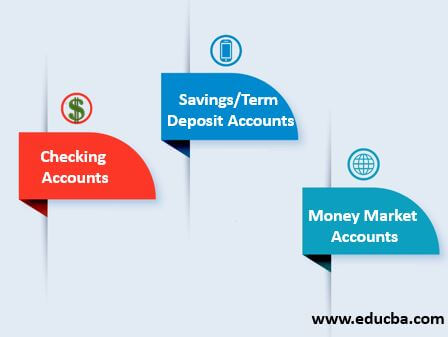Updated July 20, 2023
Introduction of Demand Deposit
Demand Deposit is a bank account that allows the depositor to withdraw funds on demand without any advance notice to the bank. An easy example is the Checking account.
It provide the funds user needed to purchase household expenses or daily expenses. The depositor can withdraw amount any time from a depository institution and there is no limit on a number of transactions a depositor can do in these accounts ( a fee may be charged by a depository institution for such transactions). This accounts allows joint owners of a single DDA, where each owner has to sign in order to open the account. While if the account needs to be closed, only one of the owners is required.
It does not pay any interest to the depositor or sometimes a notional amount of interests due to its lower lock-in term as compared to time deposit which is generated for a specific lock-in period. It pays higher and fixed interest rate.
How Does Demand Deposit Work?
DDA accounts provide an amount for daily purchases. The amount can be accessed anytime from banks. In case, if depositors needs to inform Depository institutions before withdrawing funds the depositors would have been facing difficulties while paying bills or purchasing daily necessities. DDA also mean Direct Debit Authorization, according to which you can debit from an account on paying for any goods and services.
These are also considered as part of M1 currency by the Federal Reserve, which is the most liquid type of money while measuring money supply. The money supply of a country is usually defined as the combination of currency and demand deposits. In most countries, it is considered for the majority of the money supply. During the Financial crisis, people start withdrawing cash from banks and other financial institutions, leading to a reduction in demand deposits and shortening of the money supply.
Types of Demand Deposits
Types of demand deposits are given below:
1. Checking Accounts
Checking Accounts are the accounts that provide easy access to cash. In these accounts, users can withdraw cash from ATM, Debit Cards, by writing checks anytime. However, Checking Accounts do not pay interest to the depositors.
2. Savings/Term Deposit Accounts
Saving/ Term Deposits are the accounts that are created for a longer duration as compared to Checking accounts. These accounts offer a higher interest rate as compared to no interest rate in Checking accounts. A depositor can withdraw funds in Saving Accounts from bank Teller or using Online Net Banking. These accounts do not provide a facility for writing checks for withdrawal. A Bank may charge on early withdrawal but there is no fees for maintaining these accounts.
3. Money Market Accounts
Money Market Accounts are the accounts that pay interest to consumers based on the Market Interest rate. Due to which, the interest rate fluctuates too much in these accounts and is quite unpredictable. As a result, interest rate might sometimes less than Savings account or more. However, banks does not charge any fees for maintain these accounts.
Example of Demand Deposits
Suppose, Alessandro has a 150,000$ balance in his saving account as on Nov’19 2017. On Dec’01 2017, he made a debit of 50,000$ which lefts 100,000$ in a bank on Dec’01 2017. Now, on Dec’21 2017, he deposits 25,000$ in saving account again. Assume that interest paid by the bank is 2% per annum on daily basis for a savings account.
He will get interest as follows:
- will receive interest from Nov’19 to Dec’01 on his 150,000$ amount with a 2% rate pa.
- will receive interest from Dec’01 to Dec’21 on his 50,000$ amount with a 2% rate pa.
- will receive interest from Dec’21 to DEec’31 on his 75,000$ amount with a 2% rate pa.
Features of Demand Deposits
Some of the features are given below:
- Funds can be withdrawn from the financial institution on demand.
- Interest can be paid to owners of the demand deposit account based on funds available in the account.
- There is no eligibility criteria for a user to create a demand deposit account.
- There is no limit on the number of withdrawals and transfers for a consumer.
- There is no maturity period applied in the demand deposit account.
Importance of Demand Deposits
Some of the importance is given below:
- Ease of Access to withdraw funds.
- Multiple sources to withdraw funds: ATM, Online Baking, Bank Teller, checks.
- These are also considered in Money Supply by Federal Reserve. In most countries, it is considered for the majority of the money supply.
Term Deposits vs Demand Deposits
Term deposits also referred to as time deposits, are the accounts generated for a fixed period of time The maturity period may range from one month to a few years. The depositor receives a predefined interest rate on the term deposit over the specified term. Term deposit accounts usually pay a higher interest rate than Demand Deposits. The amount deposited in Term Deposits gets locked for a specified time period.
How Term Deposit different from Demand Deposits:
- Carry Higher interest rate than Demand Deposits
- Liquidity is low as compared to Demand Deposits.
- Funds get locked-in in Term Deposits.
Advantages
Some of the advantages are given below:
- Demand Deposits allows the depositor to withdraw funds on demand without any advance notice to the bank.
- Demand Deposit allows joint owners of a single account.
- The consumer can easily access their money from Demand Deposits. Some ways are Bank Teller, Net Banking, ATMs, by writing checks.
- User can withdraw funds any time whenever required for personal use or domestic needs and ample number of transactions are allowed.
- Electronic Transfer is allowed in Demand Deposits.You do not need to carry cash when you have Demand Deposit account.
- Banks do not charge any extra fees for withdrawing the amount.
- These are also considered in Money Supply by Federal Reserve.
Disadvantages
Some of the disadvantages are given below:
- Demand Deposits pays very low interest or sometimes no interest at all. But, Banks usually charge monthly fees in order to provide services for these accounts.
- If we compare Return on Investment in Deposit accounts with Treasury bills, commercial papers, the return is quite low as compared to these investments. Similarly, there are many investments with less risk offers a higher rate of interest than Demand Deposits. Capital Appreciation in Demand Deposits is very low when compared to market inflation rates.
Conclusion
- Demand deposits accounts offer higher liquidity on comparing with any other deposit products offer. These accounts are an easily available source of cash for individuals and business. Even though the rate of return on investment is quite lower, it offers a risk-free return.
- Also, fee applied by financial institutions to maintain these deposits is much lower when compared to other investment sources available in the market.
- Also, the money supply of a country is usually defined as the combination of currency and demand deposits. In most countries, Demand deposit is considered for the majority of the money supply.
- Hence, if the main objective of an individual is to access the fund easily and not the interest earned on the amount, than Demand Deposit is the best option.
Recommended Articles
This is a guide to Demand Deposit. Here we also discuss the introduction and how does demand deposit work? along with features and importance. You may also have a look at the following articles to learn more –




